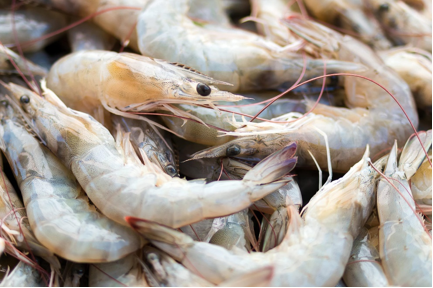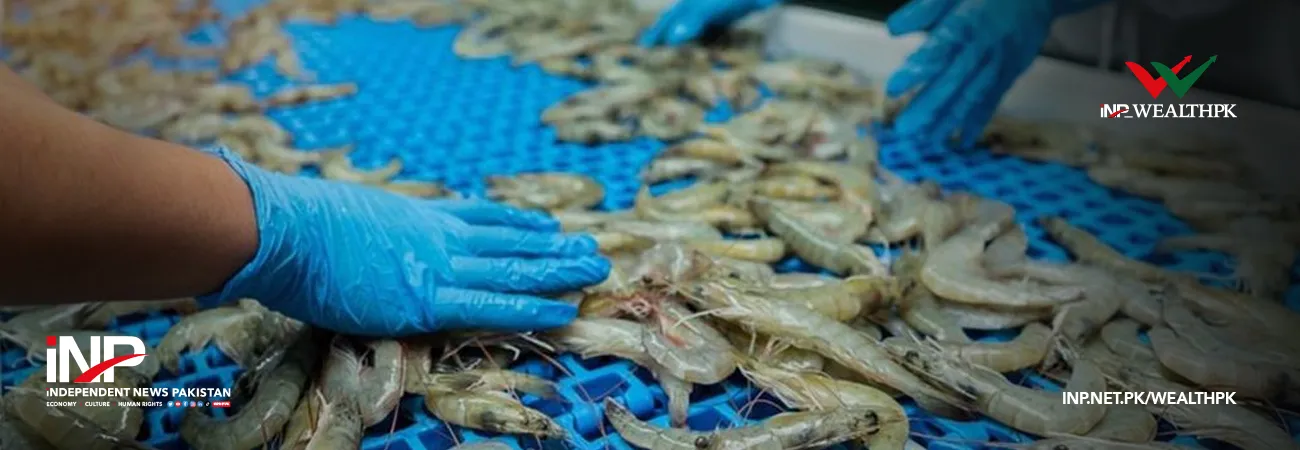INP-WealthPk
Azeem Ahmed Khan
The government has launched an ambitious project to export $1 billion worth of shrimps annually by establishing an aquaculture industry on the barren and underutilized lands of South Punjab.

“There is a huge global demand for shrimp, and Pakistan is seizing this opportunity to tap into the market with attractive profit margins,” said Director Fisheries (Shrimp Aquaculture) for Punjab Malik Ramzan while talking to WealthPK. A pilot project initiated on 100 acres in a suburban area of Muzaffargarh has successfully produced 120-ton export-quality shrimp in 104 days of culture period, he said.
“Building on this success, the Punjab government plans to expand the project to 100,000 acres to generate $1 billion in annual exports from the $40 billion global shrimp market.” Currently, Pakistan's marine aquaculture exports total about $78 million, but there is no production from the aquaculture sector, he said. The shrimp project, spanning 2024-25 to 2027-28 fiscal years, will be completed in 48 months at a cost of Rs4.43 billion, he said.
The government is also prepared to assist the investors with marketing their products both domestically and internationally, he added. Shrimp farming in saline and brackish waters has proven profitable in countries such as China, India, Ecuador, Thailand and Vietnam. Pakistan possesses favourable agro-climatic conditions for farming Litopenaeus vannamei, a high-value white leg shrimp, Malik Ramzan informed WealthPK.
With over 9 million acres of non-productive saline and brackish land, Punjab is ideally suited for shrimp farming, he said. Converting these underutilized areas into thriving ecosystems through high-value, labour intensive shrimp farming can create up to 20,000 jobs in the province, he added. “The shrimp project will also contribute to food security and sustainable development in Punjab and the country,” Malik Ramzan said.
The project will also foster local shrimp seed production to meet the domestic needs, facilitate technology transfer, and provide training to improve shrimp farming practices, he added. Being a new technology, there is no shrimp seed hatchery in Pakistan. As a result, the farmers have to rely on the costly imports of shrimp seed hatchery from Vietnam and Thailand, presenting a significant challenge to the growth of the industry,” he added.
Shrimp farming begins with the shrimp seed, which is obtained from the hatchery and stocked in ponds to grow into adult shrimp. Additionally, in an effort to increase productivity and address high seed mortality rates, the farmers often have to hire foreign consultants at high salaries due to the scarcity of local shrimp farming experts, the director of fisheries said.
To address these issues, a Shrimp Research and Training Centre will also be set up in Muzaffargarh, and foreign consultants will be brought in to cover various aspects of shrimp aquaculture value chain, he said. These experts will include specialists in breeding, farm design and culture, health management, processing, food safety, and market competitiveness, he added.
The government plans to establish a dedicated Directorate of Fisheries for Shrimp Aquaculture, while upgrading research laboratories and other facilities, he said. The farmers will receive incentives, along with land, seed, feed, and necessary equipment for operations, he added. Moreover, Malik said machinery and equipment required for shrimp farming will be available for rent, and loans will also be offered to encourage individuals to start their own shrimp farming businesses.
With its high-profit potential, the shrimp production business can be launched with a minimum investment of Rs1.7 million per acre, he added. Malik urged the youth with degrees in fisheries, aquaculture, and zoology to receive practical training in shrimp farming to become self-employed and financially independent by launching their own businesses.
The Punjab government is also offering a monthly stipend of Rs50,000 for six months to the interns at the shrimp farm of the Punjab Fisheries Department in Muzaffargarh, he added. Beyond Punjab, the coastal regions of Balochistan and Sindh provinces also feature millions of acres of unused saline and brackish land that could be converted into shrimp areas, he observed.
Credit: INP-WealthPk













